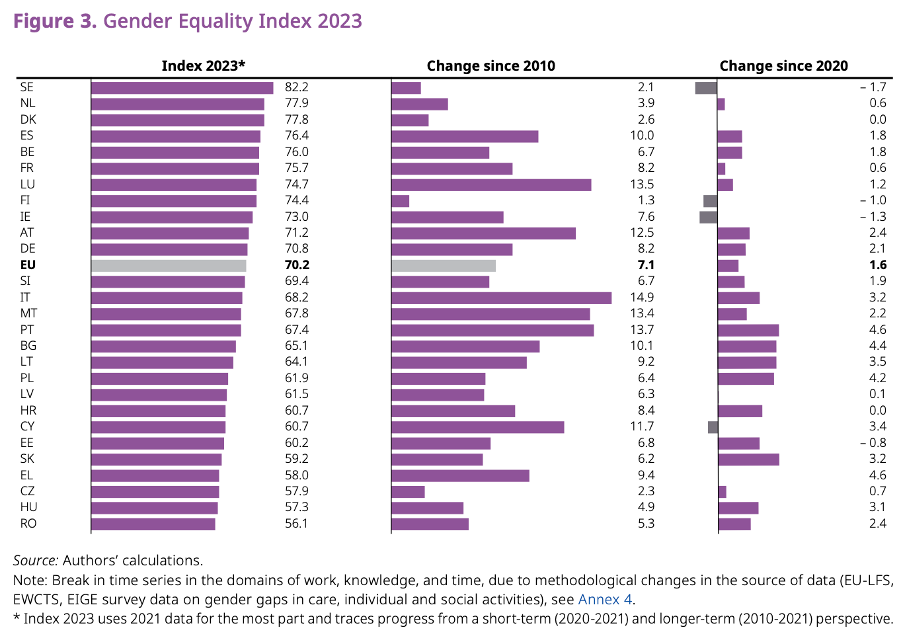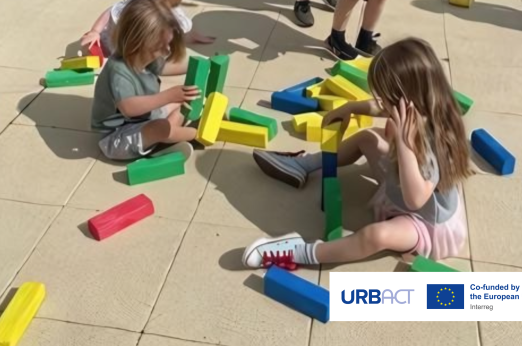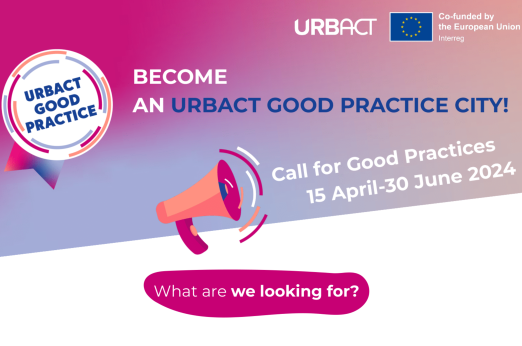It’s been over 25 years since the signing of the Treaty of Amsterdam, the legal document that made gender equality compulsory in the European Union. The work on the topic however has a longer history, as even before that, a handful of Member States were already enacting their own gender equality policies.
A wide range of laws and measures that have been put in place to combat inequality in the last quarter century, and yet it continues to be a main policy topic. So, why are we still talking about gender equality? Haven’t we moved beyond this topic?
Unfortunately, the reality is that not only haven’t we closed the gap between men and women in terms of wages, pensions, school achievement, participation in STEM fields, number of political representatives, and many other topics; in fact, recent data from the European Institute on Gender Equality (EIGE) shows that, on the whole, the EU-27 are still far from achieving gender equality. These statistics, which come from the Gender Equality Index 2022, attributed the stalling or fluctuations in progress predominantly to the gendered effects of the COVID-19 pandemic.

While all 27 Member States have enacted federal laws to translate the principle of gender equality into the national legal framework, implementation at local level remains uneven and tends to favour certain topics, despite the fact that women continue to experience urban spaces, public services, the labour market, education and training and even healthcare in Europe differently than men. Despite nearly a quarter-century of policy, the role of gender equality as a cross-cutting topic that is vital to all policy areas remains poorly understood.
This does not mean that there haven’t been some positive trends. Disparities between Member States have decreased between 2010-2022. Furthermore, there has been an increase of women in decision-making roles across 19 Member States since 2020. According to the Gender Equality Index 2023, this is a key driver of gender equality, more generally.
A handful of cities and regions, for example Vienna (AT), Barcelona (ES), Umeå (SE) and the Basque Country (ES), have made a concerted point of focusing on the role of gender in urban and regional development and have worked to push policy innovation and new approaches, including in sectors which were previously not considered relevant. Some of these cities are documented in URBACT’s Gender Equal Cities - Inspirations and Knowledge series, which is filled with testimonials and interviews from URBACT experts, partners and workshop coordinators.
However, the reality for many more municipalities, intermunicipal areas and regional authorities in Europe is that their work on gender equality implementation is hampered by knowledge and data gaps, lack of dedicated personnel, lack of awareness, lack of political support and both active and passive resistance.
For gender equality to become a reality in European cities and regions, it is critical not only to work across sectors and with a variety of stakeholders but also to work on awareness, acceptance and training at the municipal or organisational level, identifying and actively combatting stereotypes and raising awareness and allyship among men, who are all too frequently missing from the conversation. Networking and peer learning between municipalities can help transfer knowledge and effective practices as well as increase the effectiveness of those working on this topic and the policies they develop.
FEMACT-Cities & gender equality policy: taking on the implementation gap
Against this backdrop, the URBACT FEMACT-Cities Action Planning Network seeks to improve the implementation of gender equality on a local level and to increase innovation and knowledge sharing in gender equality in topics shared by the partners. Following on the success of other cities, the network’s work plan will focus on both internal and structural gender mainstreaming in the partner organisations and three thematic clusters shared by the partners: urban development, labour market and training, and health and safety. The goal of the network is to create cities and regions in which all residents, irrespective of gender, can experience freedom of movement, freedom from violence, freedom from fear, freedom to pursue their dreams, and freedom to reach their full potential.
FEMACT-Cities is composed of eight partners (Länsstyrelsen Skåne (SE), Comunidade Intermunicipal da Região de Coimbra (PT), Clermont-Auvergne Métropole (FR), Kraków (PL), Turin (IT), Municipality of Postojna (SI), Cluj Metropolitan Area Intercommunity Development Association (RO), and Szabolcs 05 Regional Development Association of Municipalities (HU)) who have embarked on a two-year journey of learning, sharing and testing in order to create integrated action plans for their local policy challenges. This network will tackle a host of topics, including gender-based violence, women’s health issues and gendered approaches to mobility planning. It will build on and complement the work of the URBACT Action Planning Network GenderedLandscape (2019-2022).
Doing the work: more from URBACT
To learn more about URBACT’s work on gender equality and how it affects your sector, check out the Gender Equal Cities report (2022), which is packed with case studies, helpful tools and methods.
Watch this video for an introduction to gender-responsive public procurement.
You can also get a refresher on 10 times URBACT has driven change for gender equal cities in recent years.
Photo by Christian Lue.
Submitted by Mary Dellenbaugh on 28/11/2023.














